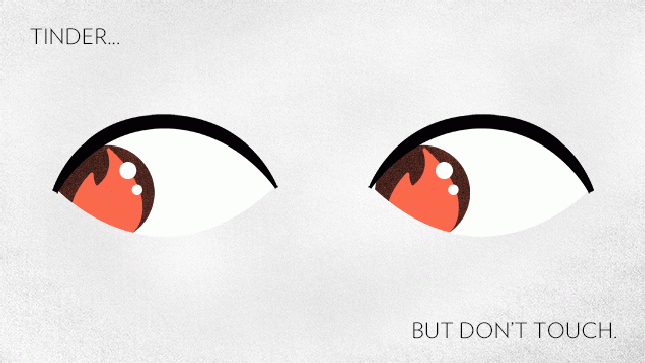No, Having a Tinder Profile Is Not Cheating
Latest

Pizza Hut has begun testing eye-tracking software with Tobii Technology to predict which pizza toppings you’ll order based on what you stare at longest. The company says it has been 98 percent accurate so far.
Let me use this moment to point out that the 1981 Michael Crichton scif-fi thriller Looker starring Albert Finney and Susan Dey, featured technology similar to Pizza Hut’s. An evil corporation is hiring models, scanning their images into a computer to use in limitless future commercials, and then disposing of the women. Key to the whole operation is eye-tracking software that shows the company exactly where eyes linger longest. It’s supposed to somehow indicate that exactly these boobs and those long legs and that perfectly feathered hair are worth all this murder, but that aside, the concept is kind of amazing.
I’ve literally never heard a man say this once about woman, that she can look at other men as long as she doesn’t touch. Have you? I have, though, had thousands of debates with girlfriends and guy friends about looking at other people while in a committed relationship and what it means to look. Some people want their significant other to never look at other people when with them. Some people want their significant other to never look at other people ever.
Some women are fine with their dudes looking at other women but not on dates, because it’s poor form. Some women are fine with a man agreeing a woman is pretty if the woman points it out first. But not OK if he is all the time bringing it up on his own. Some people don’t care who their significant other looks at, even if they are with them, and often joins in on the critiquing or admiration of the other person being looked at.
But in my experience, that other person being looked at is always a woman. I don’t know of any couples where the women looks at other men and the man joins in on the fun of talking about why he’s hot or worth checking out. This doesn’t mean it’s not common! I’ve just never heard it anecdotally and would actually love to hear if it’s common for you.
The reason I mention all this is: looking is one of the first boundaries we establish in relationships. It starts with a comfort level at who the other person looks at, and then perhaps moves on to a comfort level with who the other person spends time with, or flirts with, or communicates with to what degree and in what manner, especially given that social media and numerous apps designed for connection make the looking and wanting at an all-time high. You no longer have to leave your house to look all you want, at real people, not just porny fantasies. (Some people are fine with significant others going on and on about celebs who are attractive—”the unattainables”—but not real actual people in your social network.)
Back to eye-tracking software. In a way, we have it with social media, which leaves a trail of where our energy and attention are most focused and for the longest and in what ways we allow people into our worlds. It’s the reason Facebook can tell you’re about to break up (and according to my friends, they can tell too based on how and when you post and in what way). (I would argue another form of Looker-style eye-tracking software is your Internet history.)
There are other versions, too, such as Tinder. Even though (quite unlike staring longer at the pizza toppings you want) Tinder swiping is more about rapid-fire desire, it’s still centered entirely around the gaze and its instant evaluations.
-

-

-

-

-

-

-

-

-

-

-

-

-

-

-

-

-

-

-

-

-

-

-

-

-

-

-

-

-

-

-

-

-

-

-

-

-

-

-

-








































